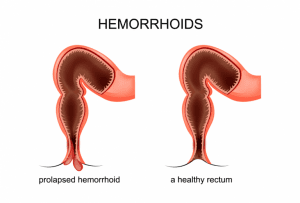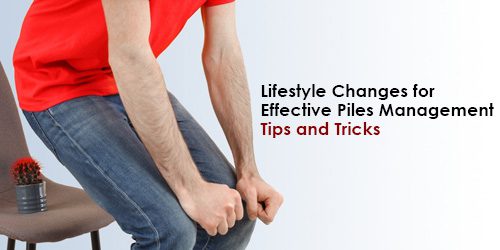Lifestyle Changes for Effective Piles Management: Tips and Tricks
Piles, also known as hemorrhoids, are a common condition that affects the veins in the rectal area. The veins in the rectal area are part of a complex network of blood vessels that help regulate bowel movements. When the veins become swollen and inflamed, they can cause discomfort, pain, and bleeding during bowel movements.
Internal and external piles are the two main types of hemorrhoids. Internal piles inside the rectum are generally painless but may cause bleeding during bowel movements. External piles occur outside the rectum and are usually painful and itchy.
The common causes include a sedentary lifestyle, poor diet, chronic constipation, and pregnancy. People who sit for long periods, such as office workers and drivers, are at a higher risk of developing piles. A diet low in fibre and high in processed foods can also increase the risk. Chronic constipation, which often results from a poor diet and a sedentary lifestyle, can cause straining during bowel movements, leading to piles’ development. Pregnancy can also cause piles due to the increased pressure on the rectal area.
Other factors that may increase the risk include obesity, aging, and family history. Obesity can put pressure on the rectal area, while aging can cause the tissues supporting the veins in the rectal area to weaken. The risk may be higher if there is a family history of the condition.
The symptoms include pain, discomfort, itching, and bleeding during bowel movements. In some cases, piles may also cause a lump or swelling in the rectal area. While piles are generally not a serious condition, they can cause significant discomfort and interfere with daily activities. When piles become severe, surgical intervention may be necessary to provide relief.
Importance Of Lifestyle Changes In Piles

- Lifestyle changes are essential in piles management as they can help reduce the symptoms and prevent recurrence. One of the most important lifestyle changes for pile management is diet modification. A fiber-rich diet can help regulate bowel movements and prevent constipation, a leading cause of piles. Foods such as fruits, vegetables, whole grains, and legumes are excellent sources of fibre that can promote good digestive health.
- Staying hydrated is also crucial. Drinking water and other fluids can help soften stool and ease bowel movements. Alcohol and caffeine should be consumed in moderation as they can dehydrate the body and worsen symptoms.
- Physical activity and exercise are also essential. Regular exercise can improve bowel movements, reduce inflammation, and promote blood circulation in the rectal area. Exercises such as brisk walking, yoga, and swimming are beneficial for piles relief.
- Maintaining good bowel habits and hygiene practices is also crucial. Avoiding straining during bowel movements and using the restroom when needed can help prevent the recurrence of piles. Proper anal hygiene practices, such as gentle wipes and avoiding harsh soaps, can also prevent irritation and inflammation.
- Stress management and good sleep hygiene practices can also help. Stress can worsen symptoms, so managing stress levels through relaxation techniques such as deep breathing, meditation, or yoga is essential.
Exercise and Physical Activity
Exercise plays a crucial role, as it can help reduce symptoms and prevent the recurrence of piles. Exercise can help improve bowel movements, reduce inflammation, and promote blood circulation in the rectal area, alleviating symptoms and preventing their recurrence.
- One of the main benefits of exercise is it can improve bowel movements. Regular exercise can help regulate bowel movements and prevent constipation, a leading cause of piles.
- Exercise can also reduce inflammation in the rectal area, reducing piles of symptoms such as pain and discomfort. Piles are caused by inflammation in the veins of the rectal area, and exercise can help reduce this inflammation by increasing blood flow and reducing pressure on the veins.
- Regular exercise can also promote blood circulation in the rectal area, improving symptoms. Improved blood flow can help reduce swelling and inflammation in the veins, alleviating symptoms such as pain and discomfort.
Importance Of Maintaining An Active Lifestyle
Maintaining an active lifestyle is crucial for piles prevention, as it can help improve bowel movements, reduce inflammation, and promote blood circulation in the rectal area.
- One of the primary risk factors is a sedentary lifestyle. Sitting for prolonged periods can lead to constipation, increasing the risk of piles
- An active lifestyle can help prevent constipation by stimulating the digestive system and promoting regular bowel movements.
- Regular exercise can also help prevent obesity, another significant pile risk factor. Excess weight can pressure the veins in the rectal area, leading to inflammation and swelling.
- Maintaining an active lifestyle can also involve incorporating healthy habits into daily routines. A high-fibre diet can help promote regular bowel movements and prevent constipation, reducing the risk of piles. Drinking plenty of water can also help soften stool and make bowel movements easier.
The Link Between Sleep And Bowel Movements
Many people don’t realize that there is a strong link between sleep and bowel movements. Poor sleep quality or insufficient sleep can lead to irregular bowel movements, constipation, and other digestive problems. Understanding the connection between sleep and bowel movements can help individuals take steps to improve their sleep hygiene and promote healthy digestion.
- Firstly, sleep affects the body’s natural circadian rhythm, which controls many bodily functions, including bowel movements. The circadian rhythm influences the release of certain hormones that regulate bowel movements, such as melatonin and cortisol.
- Poor sleep quality can also lead to stress and anxiety, contributing to digestive problems. When the body is under stress, the digestive system slows down, leading to constipation, bloating, and other digestive issues.
- Certain sleep positions can also affect bowel movements. Sleeping on the left side can help promote bowel movements by allowing gravity to aid in the passage of stool through the colon. The left-sided abdominal pain associated with colon-related issues is due to the location of the colon on the left side of the body. Sleeping on the right side or the stomach can compress the colon and make it harder to pass stool.
Prioritizing good sleep habits and addressing any underlying sleep disorders affecting bowel movements is essential.
Importance of maintaining a regular sleep routine for piles prevention
Maintaining a regular sleep routine, including prevention, is crucial for overall health.
- A regular sleep routine helps regulate the body’s internal clock and supports the release of hormones that aid digestion.
- When this internal clock is disrupted due to irregular sleep patterns or lack of sleep, it can lead to digestive problems such as constipation, bloating, and straining during bowel movements, all of which can contribute to the development of piles.
- Maintaining a regular sleep routine can also help reduce stress and anxiety, which can exacerbate piles of symptoms. When the body is under stress, the digestive system slows down, leading to constipation and other digestive problems.
Conclusion
Overall, lifestyle changes play a crucial role in effectively managing and preventing piles. By making healthy choices such as maintaining a balanced diet, staying hydrated, getting regular exercise, managing stress, and maintaining a regular sleep routine, individuals can significantly reduce their risk of developing and manage their symptoms if they already have the condition. Additionally, adopting healthy habits can help improve overall health and well-being, which can positively impact many aspects of life. While many treatment options are available for piles, lifestyle changes should be considered a key component of any management plan.
Recommended Ayurvedic Tablets For Piles
There are several ayurvedic tablets for piles that can be helpful in managing. These tablets contain natural ingredients that can help reduce inflammation, promote bowel regularity, and relieve pain and discomfort associated with piles. Along with ayurvedic tablets for piles, adopting a healthy lifestyle, including a fiber-rich diet, regular exercise, and good bowel habits, can also help in piles management.








